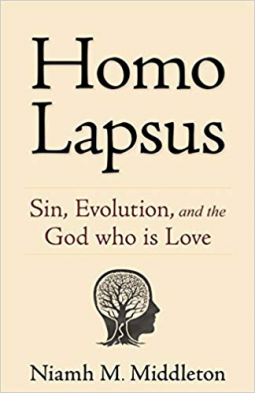
Homo Lapsus
Sin, Evolution, and the God Who Is Love
by Niamh Middleton
This title was previously available on NetGalley and is now archived.
Send NetGalley books directly to your Kindle or Kindle app
1
To read on a Kindle or Kindle app, please add kindle@netgalley.com as an approved email address to receive files in your Amazon account. Click here for step-by-step instructions.
2
Also find your Kindle email address within your Amazon account, and enter it here.
Pub Date 10 Jan 2019 | Archive Date 10 May 2019
Talking about this book? Use #HomoLapsus #NetGalley. More hashtag tips!
Description
In Homo Lapsus: Sin, Evolution, and the God Who Is Love, author and theology professor Niamh Middleton argues that evolutionary biology provides empirical evidence for Christian teachings on the related issues of human origins, the origin of evil, and the existence of a beneficent Deity. Rather than attempting to simply reconcile evolution with creation, Homo Lapsus focuses on the evolution of evil as the key to synthesis between evolutionary biology and Christianity.
The book's narrative theme focuses on the continuing battle between religion and science for priority as fields of knowledge. The passage of time has led to the development of a perspective on human nature in Darwinism that is almost identical to that of Christianity. As a result, leading evolutionary biologists are now claiming that the Genesis explanation for moral evil as being due to an "original sin" is redundant, since science can explain the inevitable evolution of traits such as greed, aggression, and the lust for power. What if, however, rather than offering an alternative explanation for evil, evolutionary science is providing empirical evidence for a doctrine of revelation?
Based on a detailed review of the evidence, Homo Lapsus argues that the evolution of evil was not inevitable, that science does corroborate a primal Fall at the outset of human history, and that in so doing it shows revelation to be a higher form of knowledge than empirical evidence.
Available Editions
| ISBN | 9781632694881 |
| PRICE | US$6.31 (USD) |
Links
Average rating from 2 members
Featured Reviews
 Reviewer 451445
Reviewer 451445
Many today believe that science disproves Christianity. Through in-depth and wide ranging examination of evolutionary biology Niamh Middleton argues that the empirical evidence actually supports the Christian worldview. There is far too much in this book to cover in a short review but in my opinion this book has potential to be a game changer and should be an essential read for anyone interested in the science/faith debate. It provides a good overview of the history of the debate surrounding human origins and shows a breadth of knowledge of the relevant areas of theological history as well. Whether or not you agree with all the arguments (I found myself agreeing and disagreeing) it is deeply thought provoking and you can tell much careful thought has gone into the processing of the issues involved and the writing of this book. I confess I didn’t agree with all the author’s thoughts on theological points but it is still thought provoking. It isn’t a book to read through quickly as so much will be missed and it will repay a second reading which I hope to do at some point. To reiterate, in the field of the science/faith debate this book falls into the must read category. Recommended.
Thanks to NetGalley and BooksGoSocial for ARC.



